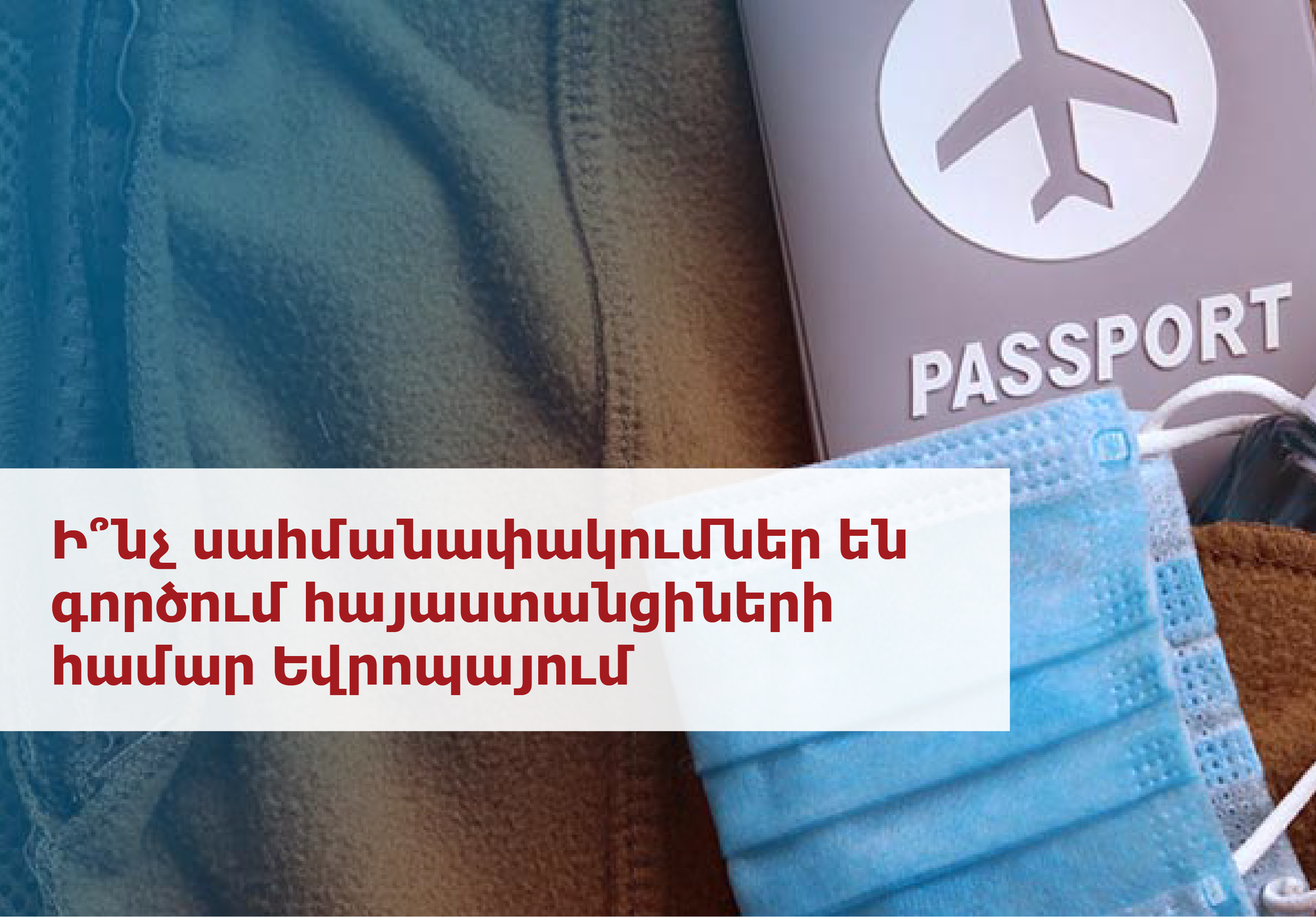
Due to the coronavirus pandemic, there are various restrictions on entry and exit of countries around the world, the information about which is usually posted on the official website of the Ministry of Foreign Affairs (MFA). This information is especially important for travelers in times of the coronavirus.
The Armenian Foreign Ministry also provides information on entry and exit restrictions to foreign countries. However, the ministry does not update the information often, despite the fact that the epidemic situation is changing rapidly both in Armenia and around the world. Moreover, for the worse. There are cases when the summer rules for those leaving Armenia are no longer relevant, and the information on the official website is outdated. The days of the latest updates are marked, but the agency does not warn that the published data may be outdated and does not provide sources of fresh and complete information.
In terms of the epidemic, Armenia has once again found itself in a dangerous “red” zone, which was announced by the Ministry of Health on September 9.
The amended rules may not yet be reflected on the Foreign Ministry website. Thus, the conditions mentioned for entering the EU member state Latvia on the website of the RA Ministry of Foreign Affairs are not enough for the RA citizens to enter that country.
Despite having a negative PCR test result within 72 hours or proof of immunization with a vaccine (QR-code) recognized in the EU, RA citizens cannot enter Latvia without mandatory self-isolation.
The website of the Latvian Foreign Ministry lists the countries whose citizens can enter the country with a vaccination certificate or a negative test result. Among them are the member states of the European Union, the European Economic Area, Switzerland, Ukraine, Turkey, Northern Macedonia, Great Britain, the United States, Australia, Israel, New Zealand and Canada.
Restrictions apply to citizens of other countries that would apply to the unvaccinated and the untested. Regardless of being vaccinated or tested.
Thus, when traveling to Latvia, Armenian citizens must be isolated for at least 7 days, after which they can take a test and, in case of a negative answer, come out of self-isolation.
Media.am decided to study the anti-epidemic restrictions in other tourist countries and compare them with the data published by the Ministry of Foreign Affairs.
Germany
The number of daily cases of infection in Germany has been increasing since June. As a rule, to go there, you need either a negative test result, or a certificate of being vaccinated, or a document on being infected-cured. Before leaving, you must register online.
Citizens of high-risk (red zone) countries should be isolated for 10 days, but they can take a test on the 5th day and in the case of a negative answer, come out of self-isolation. In Germany, the minimum security measures, including maintaining a social distance of 1.5 meters, masks in closed public areas, public transport, etc., remain relevant. However, before leaving, visit the official website of the German Foreign Ministry and get acquainted with the updates.
The information about Germany on the RA MFA website has not been updated as of September 27.
France
From June 2, France has three scales for classifying the epidemic situation in countries: “green” (the virus is not actively circulating and there are no dangerous variants of the virus), “orange” (the virus is actively circulating within controlled limits), “red” (the virus is actively circulating, there are dangerous variants).
All the countries that are not included in the green or red lists are in the orange list, including Armenia.
Fully vaccinated persons can travel to France without restriction. Acceptable vaccines include Pfizer, Moderna, AstraZeneca, Johnson & Johnson. In the case of AstraZeneca, you can leave 7 days after receiving the second dose.
Anyone over the age of 12 who arrives in France from an “orange” country and is not vaccinated must submit a negative PCR test (within 72 hours). In the case of not being vaccinated (also in the case of PCR test) the person is subject to isolation for 7 days in the place of their choice.
French public life is slowly returning to normal, but public places, restaurants, bars, shopping malls and the like can be accessed only if you have been vaccinated or infected with COVID-19, have recovered, and have proof of this. This is also mandatory for flights and public transport. You can get acquainted with the rules in more detail here.
The information about the trip to France on the website of the RA Ministry of Foreign Affairs has been updated as of September 27.
Italy
Everything is more complicated in Italy if you are not a member of the EU or a Schengen area. The government has set 5 different levels of countries depending on the epidemic situation. Armenia is in Zone D, which means that 5 days of mandatory self-isolation can be avoided if two important documents are provided:
✔️ Vaccination certificate.
✔️ A negative test result, from a test that was administered within 72 hours.
Only those who have been vaccinated or tested or have been infected or treated for coronavirus are allowed to visit indoor public areas, gyms, museums, swimming pools and other places. Wearing a mask continues to be a mandatory condition in public open and closed areas, including public transport. Depending on the pandemic situation, other rules may apply temporarily in certain parts of Italy. More detailed information can be found here.
The last update on the website of the RA Ministry of Foreign Affairs about Italy was made on August 2.
Spain
Regardless of the country you are traveling from, to go to Spain, you must fill out the Health Monitoring Form. If you are traveling by plane, you can fill out a special form on the Spain Travel Health website. After filling it out, you will receive a QR code, which you will need to show at the airport, before the flight and after landing.
If you are traveling to Spain from a country in a dangerous epidemic zone, you must present a full (all dosage) certificate of vaccination. The vaccine must be approved by the European Medicines Agency or the World Health Organization. The QR code is only valid for 14 days after vaccination. Vaccination is also mandatory for 12-18-year-olds. Children under 12 can travel without preconditions. For possible exceptions and more detailed information, click here.
In Spain, wearing masks is mandatory in closed public areas, on public transport, but it is allowed in open areas, where it is possible to keep a distance of 1.5 meters.
Restrictions on travel to Spain on the RA MFA website have not been updated as of September 27.
Austria
Although 60.6% of the Austrian population is vaccinated, there are currently severe quarantine restrictions. Depending on the epidemic situation in a given country, different rules apply in Austria.
For high-risk countries, travel to Austria is allowed only for very important reasons. Travel for tourism purposes is not one of those reasons.
If traveling from Armenia, you will need a negative PCR test result or proof of being tested (acceptable vaccines are Pfizer, AstraZeneca, Johnson & Johnson, Moderna, Sinovac and Sinopharm) or a certificate of coronavirus recovery. For those who have a negative result of the PCR test, a 10-day quarantine is also mandatory, which can be interrupted on the 5th day if you take the test again.
You can get acquainted with more details on planning a trip to Austria here. The information on the RA MFA website was last updated on September 16.
To summarize, the epidemic situation in Europe and around the world is constantly changing. Today’s data may not be up to date the next day. That is why it is very important to investigate the latest updates.
Ophelia Simonyan


Add new comment
Comments by Media.am readers become public after moderation. We urge our readers not to leave anonymous comments. It’s always nice to know with whom one is speaking.
We do not publish comments that contain profanities, non-normative lexicon, personal attacks or threats. We do not publish comments that spread hate.